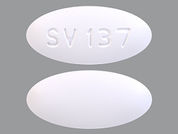Dovato
Dolutegravir Sodium/Lamivudine
What is Dovato used for?
This product contains 2 drugs: dolutegravir and lamivudine. It is used to help control HIV infection. It helps to decrease the amount of HIV in your body so your immune system can work better. This lowers your chance of getting HIV complications (such as new infections, cancer) and improves your quality of life. Lamivudine belongs to a class of drugs known as nucleoside reverse transcriptase inhibitors (NRTIs). Dolutegravir belongs to a class of drugs known as integrase inhibitors. This medication is not a cure for HIV infection. To decrease your risk of spreading HIV disease to others, continue to take all HIV medications exactly as prescribed by your doctor. Use an effective barrier method (latex or polyurethane condoms/dental dams) during sexual activity as directed by your doctor. Do not share personal items (such as needles/syringes, toothbrushes, and razors) that may have contacted blood or other body fluids. Consult your doctor or pharmacist for more details.
CHEMICAL NAME
DRUG TYPE
HivDovato Prices
Searching for the lowest prices
Dovato Frequently Asked Questions
Headache or trouble sleeping may occur. If either of these effects lasts or gets worse, tell your doctor or pharmacist promptly.
Remember that this medication has been prescribed because your doctor has judged that the benefit to you is greater than the risk of side effects. Many people using this medication do not have serious side effects.
As your immune system gets stronger, it can begin to fight off infections you already had, possibly causing disease symptoms to come back. You could also have symptoms if your immune system becomes overactive. This reaction may happen at any time (soon after starting HIV treatment or many months later). Tell your doctor right away if you have any serious symptoms, including: unexplained weight loss, severe tiredness, muscle aches/weakness that doesn't go away, headaches that are severe or don't go away, joint pain, numbness/tingling of the hands/feet/arms/legs, vision changes, signs of infection (such as sore throat that doesn't go away, fever, chills, swollen lymph nodes, non-healing skin sores), signs of an overactive thyroid (such as irritability, nervousness, heat intolerance, fast/pounding/irregular heartbeat.
Tell your doctor right away if you have any serious side effects, including: mental/mood changes (such as depression, anxiety), signs of kidney problems (such as change in the amount of urine).
Rarely, this medication has caused severe (sometimes fatal) liver problems and a buildup of lactic acid in the blood (lactic acidosis). These serious side effects may occur more often in women and obese patients. Get medical help right away if you have any of the following serious symptoms, including: symptoms of liver problems (such as nausea/vomiting that doesn't stop, loss of appetite, stomach/abdominal pain, yellowing eyes/skin, dark urine), symptoms of lactic acidosis (such as deep/rapid breathing, drowsiness, nausea/vomiting).
A very serious allergic reaction to this drug is rare. However, get medical help right away if you notice any symptoms of a serious allergic reaction, including: rash, itching/swelling (especially of the face/tongue/throat), severe dizziness, trouble breathing.
This is not a complete list of possible side effects. If you notice other effects not listed above, contact your doctor or pharmacist.
In the US -
Call your doctor for medical advice about side effects. You may report side effects to FDA at 1-800-FDA-1088 or at www.fda.gov/safety/medwatch-fda-safety-information-and-adverse-event-reporting-program.
In Canada - Call your doctor for medical advice about side effects. You may report side effects to Health Canada at 1-866-234-2345.
IMPORTANT: HOW TO USE THIS INFORMATION: This is a summary and does NOT have all possible information about this product. This information does not assure that this product is safe, effective, or appropriate for you. This information is not individual medical advice and does not substitute for the advice of your health care professional. Always ask your health care professional for complete information about this product and your specific health needs.
